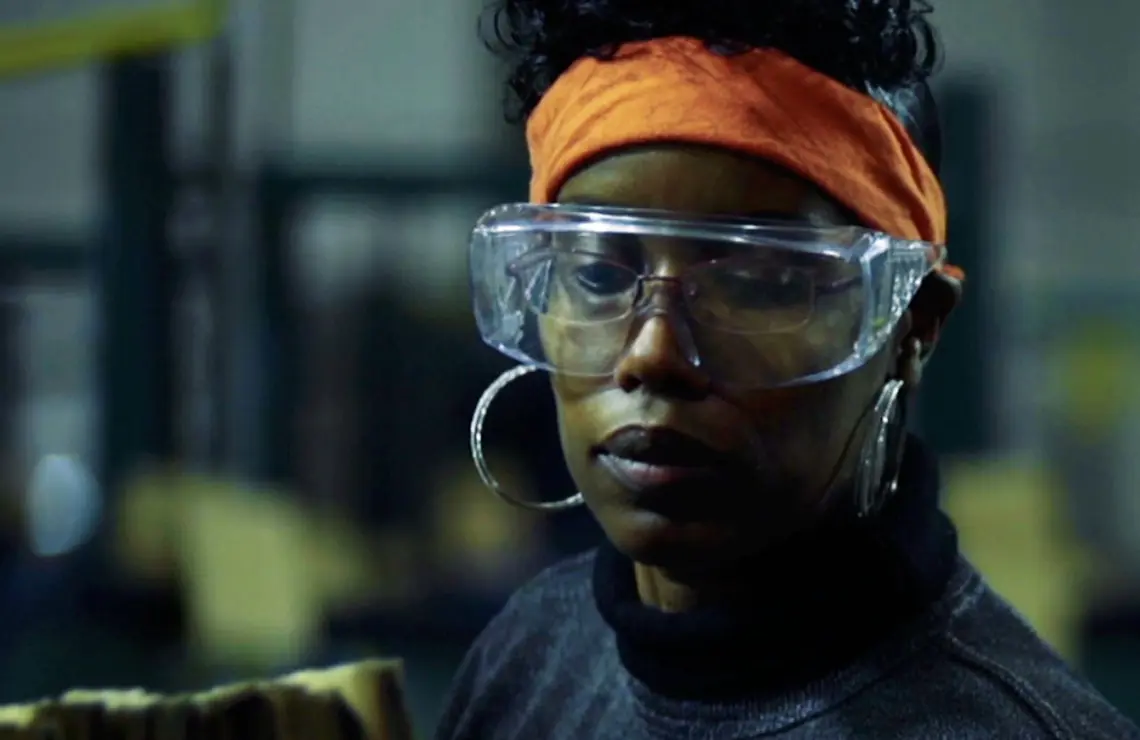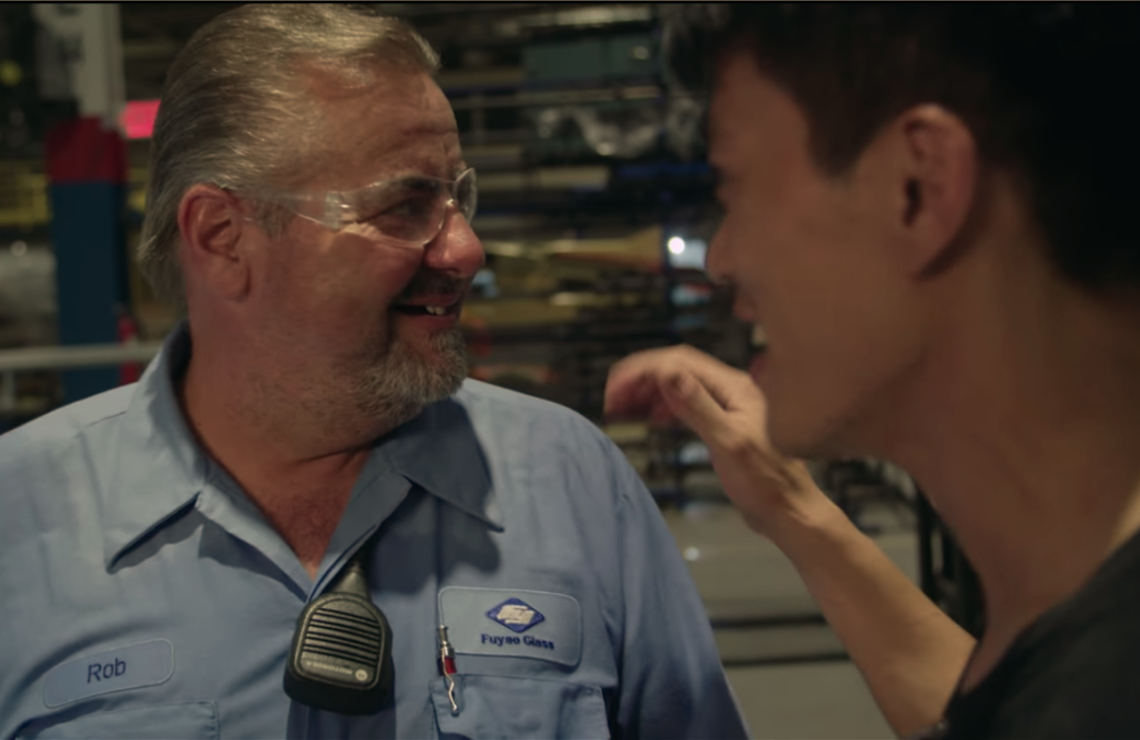The Obama-Backed American Factory Could Not Have Been Better Timed
-
 Shawnlea, a former GM worker, was making $30 a hour. At Fuyao, she's paid $12.84 an hour. (Netflix)
Shawnlea, a former GM worker, was making $30 a hour. At Fuyao, she's paid $12.84 an hour. (Netflix)What’s the best way to describe the first Netflix program to bear the seal of Barack and Michelle Obama’s Higher Ground Productions? Well, let’s say you have an uncle. And let’s say — hypothetically — that he hates Barack Obama. Can’t stand the guy. Thinks America became great again the minute Obama left the White House.
I think you could sit that uncle down in front of American Factory, a documentary that began streaming last week, and an hour and a half later he would still be watching it. And would have no idea that it has 44’s imprimatur.
American Factory tells the story of a shuttered Midwestern auto plant that comes roaring back to life when a Chinese billionaire buys it. Suddenly, thousands of former auto workers have jobs again — though not exactly at their old union wages. Joining them are a couple hundred Chinese employees from the home office, who are so deeply schooled in the company’s culture they can sing the corporate anthem by heart.
“We’re melding two cultures together here,” says a recruiter in the film’s opening minutes. “Chinese culture and American culture.”
American Factory’s timing could not have been better — it arrives just as the current president is waging a trade war with China, and lends much-needed depth to an issue that is almost criminally shortchanged in the news media. Maybe 45 can “accidentally” watch it like he does Bill Maher’s show.
More than fair-minded, American Factory is empathetic toward everyone involved in this issue, even as this experiment in bringing back U.S. manufacturing jobs starts to go sideways. That’s probably because directors Steven Bognar and Julia Reichert lived not far from the Fuyao Auto Glass factory, located in a former GM plant in Dayton, Ohio, and spent years developing relationships with the people whose lives unfold in this absorbing film.
Admirably following the stories of a diverse group of people — from managers to line workers to the Chinese tycoon behind the factory — Reichert and Bognar help us see that one company’s experiment in cultural mixing is really the future of work in America, and raises all kinds of questions to which there are no easy answers.
Cao Dewang started Fuyao in 1987 in Fujian Province, supplying windshields to Chinese car makers. He now has a 70 percent global share of the auto-glass aftermarket. In 2014, he began looking to expand his U.S. operations, and saw an opportunity in Dayton, a city that was hurting long before the recent mass shooting there.
GM was arguably Dayton’s second-biggest corporate loss. NCR, the office machine giant, called Dayton home for decades until it relocated to Georgia. PBS’s Frontline last year did an outstanding hour on Dayton’s slide from model city of Midwestern productivity to Rust Belt burnout, which you should watch if American Factory intrigues you.
The Chinese are accustomed to pumping money into local economies around the world, but the Chairman — as Cao is repeatedly referred to, without irony — has never encountered a place like Dayton. “Wow, it was really well developed then,” he says, touring a museum with pictures of the city in its GM heyday. But if Cao thinks Americans are going to respond with unbridled gratitude to a flood of new jobs, he’s in for a big culture shock.
The former GM workers never really seem that excited about working for Fuyao. An employee named Shawnlea explains that she was earning almost $30 an hour as a UAW worker at GM. She’s making $12.84 an hour at Fuyao. When the GM plant closed, she says, “I lost my home, I lost my vehicle.” She doesn’t say if she has her home back now. A forklift operator at Fuyao is living in her sister’s basement. Since losing her GM job, she says she’s been “struggling to get back into the middle class.”
We also get to know a 20-year Fuyao veteran named Wong, who has been brought over to Dayton (on a fancy visa, presumably) to stoke the red-hot glass furnaces. “We workers lay down tracks so the train can run smoothly,” he says reflectively. He’s proud of the work he does, and like most Chinese Fuyao workers seen here, exhibits a fierce loyalty to his longtime employer.

Yet he also clearly admires Americans, and forms a close friendship with Rob, who invites him over for Thanksgiving dinner and to shoot off pistols in his backyard. “My Chinese brother, I would have his back,” Rob says. “I just think the world of him.”
Fuyao’s Chinese management, though, generally regards the American workers as problem children who are “overconfident,” need to be “continuously praised,” are “lazy” and “have fat fingers” and talk so much that one supervisor wishes he could “put duct tape on their mouths.”
Wong sees it differently. “I really admire Americans, they can work two jobs,” he says. “I always thought Americans lived a comfortable and superior life. I thought they didn’t have to make sacrifices.”
But Wong is also willing to accept the physical hazards of working in conditions that American workers rightly consider unsafe. Fuyao last month was fined nearly $725,000 after OSHA found “multiple safety hazards” at Dayton plant, and the filmmakers document plenty more incidents of hazardous work conditions in American Factory. It’s also a theme in the employee reviews at Fuyao’s Indeed page, and appears to be the No. 1 reason that the Americans begin talking about joining the UAW.
“If a union comes in, I’m shutting down,” Chairman Cao declares matter-of-factly. He’s incensed at the Americans’ ingratitude. When Ohio Sen. Sherrod Brown gives a shout-out to unions at the plant’s grand opening, a manager declares that the senator is banned from the premises.
In Harlan County USA, Barbara Kopple’s 1976 documentary about an insane coal strike, the bosses hired goons to shoot and maim striking miners, nearly all of whom lived in abject poverty. There are a lot more gray areas in American Factory. The workers in Dayton are poor but not Appalachian poor. And their Chinese managers don’t send in muscle to deal with troublemakers — they just fire them and pay a “labor consultant” $1 million to convince the others that organizing would be a waste of everyone’s time.
With these and other storylines, American Factory continually strives to be both fair and interesting, which is harder than it sounds. Humor helps, and a reliable source are the things that don’t quite translate. In the Dayton lobby, a slogan is installed in shiny block letters: MARCHING FORWARD TO BE WORLD LEADING AUTO GLASS PROVIDER. A security guard casually looks up and notes, “It should be the.”
Later, several American managers are flown to China to tour Fuyao headquarters and attend a company banquet, where the evening’s entertainment includes a musical number with chorus girls singing the praises of “lean intelligent manufacturing.” (It’s not quite as catchy as “Look for the Union Label.”) Later, the Americans go on stage and dance to “YMCA,” followed by what I think was six couples getting married on stage in a mass ceremony (?!).
These and other scenes make me wish that I had seen American Factory, which debuted at Sundance, in a theater with an audience. There are some big laugh lines and some uncomfortable moments, and it would have been interesting to feel the crowd reacting around me. What I’m saying is, watch it with others — your friends, coworkers, hell, even your uncle.
People are talking about American Factory in our forums. Join the conversation.
Aaron Barnhart has written about television since 1994, including 15 years as TV critic for the Kansas City Star.
TOPICS: American Factory, Netflix, Barack Obama, Michelle Obama, Documentaries, Higher Ground Productions